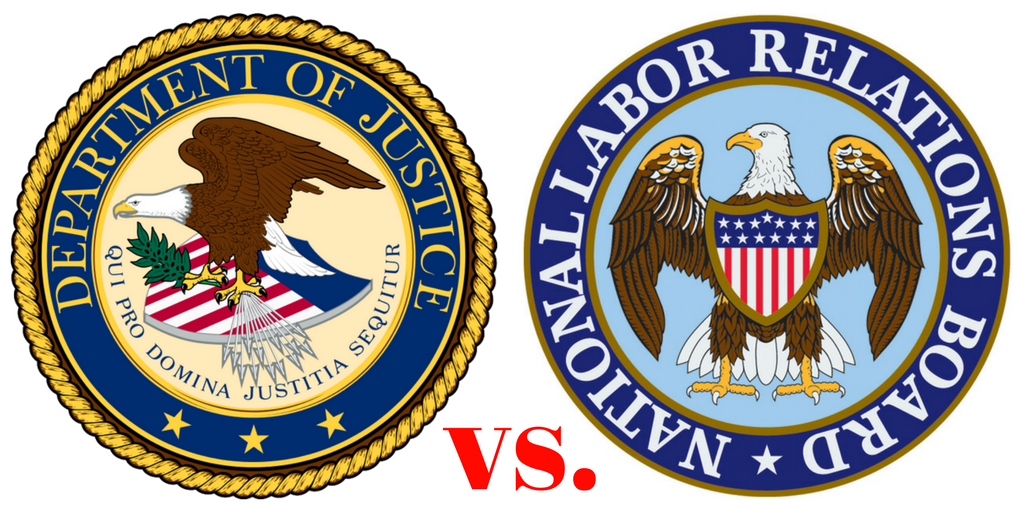In another clear sign of the policy shift from a Democratic to Republican administration in Washington, D.C., the U.S. Department of Justice has reversed course on a significant labor issue pending before the Supreme Court–class waivers through employment arbitration agreements.
Under the Obama Administration, the National Labor Relations Board repeatedly held that arbitration agreements prohibiting employees from filing class actions violate the National Labor Relations Act. The U.S. Courts of Appeal from different parts of the country have disagreed over whether the NLRB is correct. Last year, the DOJ sought and obtained the right to take one of these cases before the Supreme Court. Now the DOJ has announced that its previous position was wrong.
What are Class Waivers?
Individuals usually may file lawsuits not only on behalf of themselves but also on behalf of other allegedly similarly aggrieved parties. These are known as class or collective actions.
Through arbitration agreements, parties can agree that any disputes between them will not go to court. Instead they will be subject to arbitration. Arbitration is a less formal process where a neutral third party, whom the parties select, replaces the judge and jury . Upon hearing the evidence of the dispute, the arbitrator issues a decision in the case.
Many employers include class action waivers in arbitration agreements that employees must sign as a condition of employment. In other words, if there is a dispute regarding employment issues, each employee’s case must be heard separately.
The NLRB’s Current Position on Class Waivers
The National Labor Relations Act protects covered employees’ right to engage in concerted activity for their mutual aid and protection. Beginning in 2012, the NLRB has consistently ruled that arbitration agreements that prohibit employees from pursuing class actions violate the NLRA.
The NLRB’s position is that since employees have a federally protected right to act together to improve terms and conditions of employment, they likewise have a right to resolve their disputes collectively. The NLRB has not been unanimous in this view. Democratic members of the Board agree on this position, but the Republicans disagree.
DOJ’s Change in Position
On September 9, 2016, the DOJ filed a petition for writ of certiorari with the U.S. Supreme Court in the case of National Labor Relations Board v. Murphy Oil USA, Inc. Through that filing, the DOJ sought to reverse a decision of the U.S. Court of Appeals for the Fifth Circuit that had disagreed with the NLRB’s position. In other words, the appeal to the Supreme Court originally sought to enforce the NLRB position that the employer’s class waiver violated the National Labor Relations Act.
The Supreme Court accepted the Murphy Oil case along with two others challenging Court of Appeals’ decisions in the NLRB’s favor. The cases have been consolidated on appeal. The Supreme Court’s decision will likely create consistency across the country on this issue.
On June 16, 2017, the DOJ filed a brief on behalf of the employers in these consolidated cases. In other words, the DOJ rejects its own arguments from last September.
The DOJ now emphasizes the strong federal policy in favor of arbitration agreements.
Future of Class Waivers
Although it is somewhat unusual for the DOJ to directly contradict itself, it is not at all surprising that the Trump Administration sees this issue differently from President Obama’s. This is not the first indication of a change in federal labor policy. (See my earlier post on the Trump DOL Already Departing from Obama-Era Positions.)
Barring something unforeseen, the Supreme Court is likely to rule on the class waiver issue in the next year. With Trump-appointee Justice Gorsuch now on the Court, it is quite possible that the class waivers will prevail.
At the same time, President Trump has the opportunity to fill vacancies on the NLRB to create a Republican majority. Thus, one way or the other, the NLRB’s current position will probably be “Trumped.”
In the meantime, employers using class waivers in mandatory arbitration agreements may face challenges before the NLRB. Those doing so must weigh the risks of potential unfair labor practice charges against the reasonable possibility of ultimately prevailing if they fight the case out long enough.
